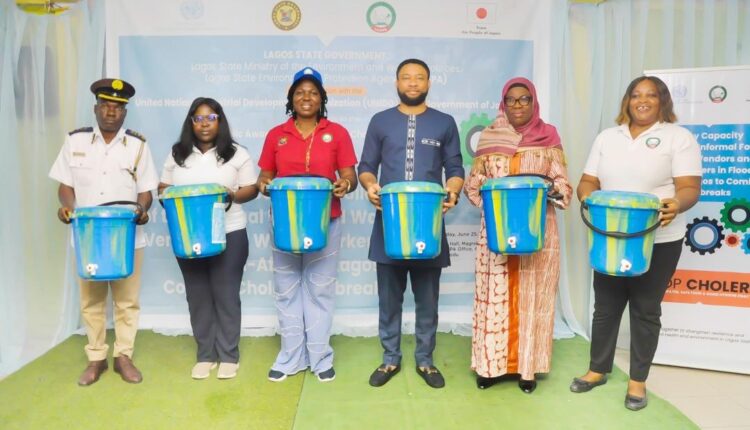PROJECT 240236: LASEPA, UNIDO, JAPANESE GOVERNMENT HOLD CHOLERA PREVENTION SEMINAR IN IKORODU DIVISION

In a proactive move to combat the spread of cholera in flood-prone communities, the Lagos State Environmental Protection Agency (LASEPA), in collaboration with the United Nations Industrial Development Organisation (UNIDO) and the Government of Japan, have kicked off a public awareness and sensitisation seminar for informal food and water vendors, as well as waste managers in the Ikorodu Division of Lagos State.
This initiative, under Project 240236, is aimed at strengthening public health resilience in vulnerable communities.

The sensitisation seminar, held recently at Magrellos Hall, Ayangburen Road, Ikorodu, was funded by the Government of Japan through UNIDO. It focused on equipping key stakeholders – including food and water vendors, and waste workers – with the essential knowledge and tools to prevent and respond effectively to potential cholera outbreaks in flood-prone areas.
Speaking at the well-attended event, Permanent Secretary, Office of Environmental Services, Ministry of the Environment and Water Resources, Mr. Omobolaji Tajudeen Gaji, emphasised the urgent need for public health education and behaviour change.
Mr. Gaji, who was represented by the Director, Environmental Sanitation, Dr Hassan Sanuth, noted that while many residents may not fully understand cholera or recognise its symptoms, the consequences, if untreated, can be fatal.
Mr. Gaji explained that cholera is often caused by contaminated water and food, a risk amplified by poor sanitation and open defecation practices common in overcrowded and underserved areas.
He highlighted how Lagos’ rapid population growth and pressure on the available sanitation infrastructure are exacerbating the health risks, particularly in flood-prone communities like Ikorodu.
He further cautioned that with Lagos being a coastal state with a high water table and rivers crisscrossing various communities, contaminated waste can easily infiltrate drinking water sources. “Even shallow wells, which many households rely on, are susceptible to pollution from nearby waste disposal and open defecation,” he noted.
In his welcome address, the General Manager of LASEPA, Dr. Babatunde Ajayi highlighted that the seminar was part of LASEPA’s emergency capacity-building programme to address recent cholera outbreaks in Ikorodu and other flood-prone parts of Lagos.
Dr. Ajayi, who was represented by the Director, Research and Development Department, Mrs. Abdulwarees Solanke, appreciated the efforts of UNIDO and the Government of Japan for supporting this critical initiative.
He stressed the importance of equipping informal vendors and waste workers with preventive strategies, including hygiene best practices, food safety, and the use of clean water, to protect public health. “These stakeholders play a crucial role in the food and water supply chain, and their practices directly impact the health of the communities they serve,” he stated.
Also speaking at the event, the Permanent Secretary, Lagos State Ministry of Health, Dr. Olusegun Ogboye, represented by Mrs. Beatrice Adeyemo, recounted the State’s experience during last year’s cholera outbreak, which affected 18 Local Government Areas and resulted in several fatalities.
He noted that the outbreak was traced to the consumption of contaminated tiger nuts and stressed the importance of personal and community hygiene, including proper handwashing, safe water handling, and improved sanitation.
Dr. Ogboye praised the collaborative efforts of the Ministry of Health, the Ministry of the Environment, LASEPA, and other public health stakeholders in containing the outbreak.
He reiterated the need for continuous community sensitisation and called on residents to report unhygienic practices to the authorities.
The UNIDO’s Field Coordinator, Mr. Charles Uzoma, explained that the seminar is part of a larger emergency response project funded by the Government of Japan. He said the intervention was initiated after LASEPA reached out to UNIDO for support during the previous cholera outbreak.
Mr. Uzoma stressed that informal food and water vendors were identified as a weak link during outbreaks due to the use of contaminated water in food and beverage preparation. The project, he said, is designed to empower these vendors with the knowledge and resources to adopt safer practices.
The event concluded with an appeal to all stakeholders to maintain proper hygiene, ensure safe food and water handling, dispose of waste responsibly, and collaborate with government agencies to maintain a clean and healthy environment.
Participants included grassroots workers, LG officials, health workers, civil society organisations, and members of the informal workforce in water and food handling, among others.


